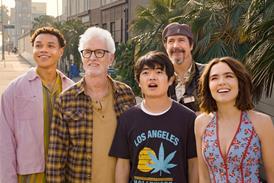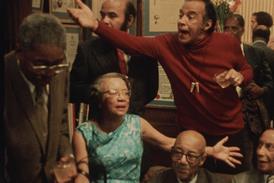Dir: Genjiro Arato. Japan. 2003. 159mins
A veteran producer of Seijun Suzuki (Zigeunerweisen, Kageroza, Yumeji) and the director of the 1995 The Girl Of The Silence, Genjiro Arato has returned to screen after an absence of eight years with Akame 48 Waterfalls, a film with Suzuki's characteristic mix of traditional Japanese aesthetics and the surreal.
It is not, however, a Suzuki homage so much as Arato's attempt to update that quintessentially Japanese form - the autobiographical "I novel", the dominant genre in Japanese literature, from the end of the 19th century to after World War II - for the screen. The 1998 novel by Chokitsu Kurumatani on which the film is based may be set in the present day, but the situation and surroundings of its hero, a high-strung writer, are throwbacks to Japan of a generation or more ago. The film screens this week at Berlin in the Panorama section.
The hero, Yoichi Ikushima (Takijiro Onishi), is not only out of step with everything and everyone around him - his acts and encounters are charged with symbolism and danger, as in a dream. This sense of being caught in an alternative reality where time has stopped, watching a darkly interior drama shot through with explicit eroticism and grotesque humour make Akame an unusual film - half way between a period piece and an avant garde experiment. As such it may have difficulty finding a marketing niche abroad, though Japan it has won a slew of awards and honours, including inclusion in the prestigious critics poll of Kinema Junpo magazine as one of the ten best films of 2003.
Ikushima begins his journey in Amagasaki, a gritty port city near Osaka. Broke and alone, he finds a job skewering meat on sticks for Seiko (Michiyo Okusu), a sultry, world-wise restaurant proprietress. She sizes him up instantly as a lost soul, but takes a liking to him nonetheless and sets him up in a tiny room, with all tools of his new trade
He sets stolidly to work, but the other rooming house residents, all members of the underworld, treat him with barely disguised contempt. One is a crusty tattoo artist (Yuya Uchida) whose clients and hangers-on are yakuza. Still another is Aya (Shinobu Terajima), a brash young club hostess. She is curious about the new boarder, but wonders, like everyone else, what he is doing in their closed little world.
These neighbours and even total strangers are forever barging into Ikushima's room to make threats, requests, demands. By going along - delivering a pistol for the tattoo artist, going on a dodgy errand for Seiko - he begins to win their grudging acceptance, if not respect.
It is Aya, though, who drags him, blinking and wary, from his shell. She brings him first ripe cherries, then her body, then her dreams. He take everything in with a look of permanent surprise - he has been alone too long to easily accept human companionship, let alone love. But when she asks him to take her "out of this world," he is ready to comply - even if it means leaping from one of the fabled 48 falls of Akame.
As Ikushima newcomer Takijiro Onishi is too intense by half, but he understands Ikushima's stubborn determination to purge himself of his past. Stabbing chunk after chunk of meat, he seems to be exorcising personal demons. It is Shinobu Terajima as Aya who makes the strongest impression, however. The daughter of yakuza movie diva Junko Fuji, Terajima - recently seen in Vibrator - brings some of her mother's commanding screen presence, as well as an erotic charge and emotional hunger all her own. In a film half in love with easeful death, she is a standing invitation to life.
Production company: Akame 48 Waterfalls Production Committee
Jap dist/int'l sales: Akame Seisakusho 813-3412-2041 info@akameworks.com
Producer: Nobuichiro Muraoka
Screenplay: Muneya Suzuki
Cinematography: Norimichi Kasamasu
Editor: Yoshiyuki Okuhara
Music: Shuichi Chino
Main cast: Shuichi Chino, Takijiro Onishi, Shinobu Terajima, Michiyo Okusu, Yuya Uchida, Hirofumi Arai



















No comments yet